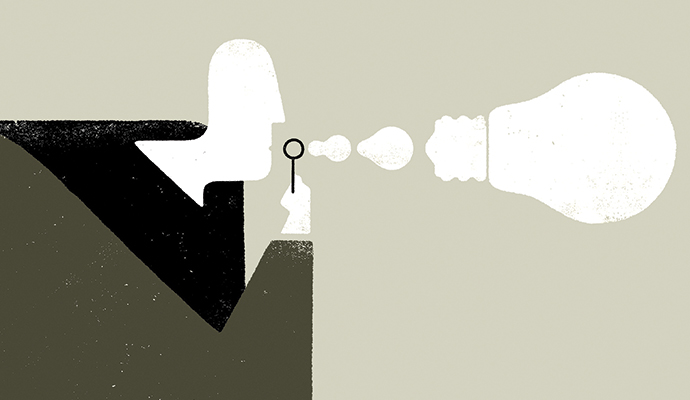Customers Behaving Badly
When consumers are rude and abrasive, it’s up to managers to help employees deal with the stress.
(originally published by Booz & Company)Bottom Line: Rude and abusive customers can have a pernicious effect on employees’ attitudes and firm performance. To keep workers engaged in the face of such behavior, managers must emphasize that a company has its employees’ backs.
Too often, that adage just doesn’t hold true: The customer isn’t always right. In fact, the customer can be aggressive, belligerent, or a downright bully to employees—especially as the friendly era of the mom-and-pop shop gives way to the impersonal superstore, the lingering frustrations of the Great Recession, and the relative anonymity of Internet commerce. Studies have suggested that increasing levels of psychological abuse inflicted by customers can damage firm performance in the long run by eroding management’s ability to retain valued staff members who can’t handle the stress.
This type of customer dysfunction goes far beyond reasonable complaints, a negative review on Yelp, or justifiable criticisms of a company’s actions. It is the incivility that results when the customer-is-king maxim is taken too far, requiring employees to keep up a good attitude even when being yelled at, intimidated, or threatened.
According to a new study of frontline service employees, managers need to step in and actively intervene when their subordinates are under attack. For too long, employees have had to put up with the outrage of irrational customers as part of the job. But after they’ve dealt with a particularly difficult customer, the authors of this paper found, employees’ relative level of satisfaction with how the incident played out is based far more on the support they receive from their company and supervisors than anything else.
Indeed, more than 70 percent of the time, employees’ feelings about dealing with rude customers were linked to how their firm responded: Did their manager step in to help, offer support, or give them a well-deserved break after the ordeal? Or was the employee expected to simply deal with it, or even somehow blamed for the incident, a mind-set widely perceived as inherently unfair?
“Given the central role employees play in providing superior customer service and thereby contributing to firms’ success, managers must help employees recover from the damage (e.g., mental stress) customers’ dysfunctional behavior inflicts,” the authors write.
The researchers conducted two separate surveys of employees who encounter dysfunctional customers during their jobs at call centers, or in the banking, healthcare, hotel, and travel industries, and considered four pillars of on-the-job fairness and managerial intervention. Specifically, the authors analyzed whether employees received social support from their managers, participated in decision making, felt empowered to solve problems, or were rewarded for dealing with bad-mannered customers.
Contrary to the authors’ expectations, one of these factors—giving employees a bigger say in corporate policy—had absolutely no placating effects. In a large organization, the authors reason, employees don’t realistically expect to have a say in the centralized decision-making process, so they don’t resent this lack of input. Instead, employees appreciate the smaller things. They crave the empowerment to handle issues themselves—which is viewed as a vote of confidence from management—but also the ability to reach out to supervisors for counseling, guidance, and empathy.
Most of all, employees want to be rewarded for playing the (not literal, one would hope) punching bag. This recompense can be relatively informal (such as a public acknowledgment, a more challenging assignment, or a small promotion) or tangible (such as better pay or job prospects). Managers should try to ensure that “employees are rewarded in direct proportion to the level of stress caused by interactions with dysfunctional customers,” the authors advise.
Indeed, managers have the most impact when they help employees who suffer through more serious or frequent incidents with dysfunctional customers, the authors found, and these should be the first staff members supervisors seek to support. Managers, therefore, must be highly attuned to the goings-on around them. Companies should look to hire supervisors with experience in reducing on-the-job stress, and consider linking their performance evaluations, career advancement, and pay upgrades to how effectively they step in to help their employees.
And problems should not be swept under the carpet. Supervisors must encourage their subordinates to report negative customer interactions, the authors write. Employees often think they have to ignore such incidents, unload their problems on the person in the cubicle next to them, or simply bury the negative feelings dredged up by dysfunctional customers. When these emotions fester for too long, the employees decide to leave.
The authors also suggest that companies actively alert customers that they will not tolerate abuse—whether through signage, advertising, legal deterrents, or Internet postings. Customers who habitually behave badly, whether online or in person, should be banned from further interactions with the company, and managers can also rotate employees’ responsibilities to ensure that individuals do not bear the brunt of recurrent dysfunctional customer behavior.
Customers who habitually behave badly should be banned from interactions with the company.
Importantly, ill temperament can be a two-way street. Although managers may view the presence of difficult customers as inevitable, some research has suggested that disgruntled employees can lead, in turn, to grumpy customers. Cheering up the staff, therefore, could be the first step to establishing an atmosphere of decorum.
Source: Helping Employees Deal with Dysfunctional Customers: The Underlying Employee Perceived Justice Mechanism, by Taeshik Gong (University of Strathclyde), Youjae Yi (Seoul National University), and Jin Nam Choi (Seoul National University), Journal of Service Research, Feb. 2014, vol. 17, no. 1




